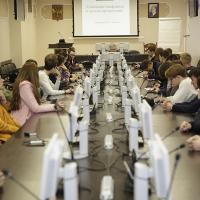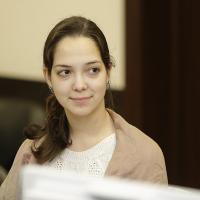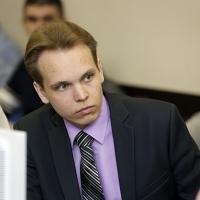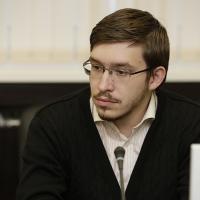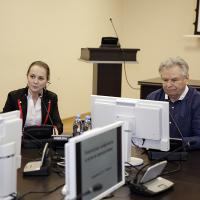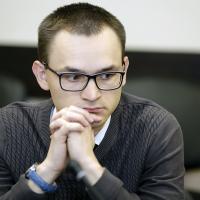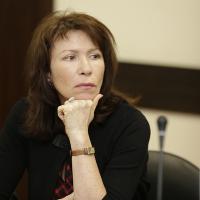On May, 11 the final for this academic year lecture of the project "Academic readings" was held. It was devoted to one of the global problems of mankind, confrontations based on ethnicity and cultural differences. The choice of topic is not accidental. When Academician V.A. Tishkov delivered a lecture at MEPhI in 2016, students asked him about ethnic conflicts. The answer to it was the lecture on "Ethnic Conflicts and Ways of Overcoming them" held on Thursday.
The study of the nature of ethnic confrontations is the main direction of scientific activity of Tishkov, a historian and anthropologist, famous throughout the world not only for theoretical, but also practical research work. The Quebec conflict in Canada on the right to self-determination, separatism in Catalonia, armed conflicts in the Balkans, Chechnya and Central Asia - all this Tishkov saw with his own eyes. The scientific comprehension of these and many other events enabled him to develop a system for the analysis and early warning of conflicts on an ethnic basis. But for this it is necessary to understand why there is an increasing struggle not between states, but between different ethno-cultural groups.
The lecturer pointed out that the differences between nations do not necessarily lead to an open armed clash. The opposition "we" and "they" is associated with a whole complex of conditions and resources, for which groups of people compete. But it is ethnicity, belonging to a specific cultural, linguistic, national culture that is often used to mobilize for struggle.
As the lecturer pointed out: "The causes of ethnic conflicts can be discrimination, some historical injustices, historical memory of slavery and colonization, a really humiliated situation when social inequality passes along ethnic boundaries. When representatives of one people are in power, they hold resources in their hands, while others take socially lower positions and are generally not represented in power. But the interesting is that in separatist conflicts not the poorest nations or parts of the country want to secede ... Hence, at times separatism can be not only because of discrimination, and behind it may be the reluctance to share and the reluctance to "feed" others ... At the core of separatism there may be an ethnic brand, but beyond that lies more ... Cultural differences are becoming more important now. If we call the separatist conflict ethnopolitical (that is, the conflict over the status), then conflicts based on religious differences, and sometimes ethnic ones, are also called ethnoconfessional. And these conflicts have recently come to the forefront. Why? It seems that the world has become more complicated, at our level of natural science, and suddenly religion comes to the forefront ... My explanation is that, despite the fact that we know so much about ourselves, about the world and about matter, there remain some areas of our life , which we can not fully explain (the life and death of a person, his fate, various other irrational phenomena). Therefore, the importance of beliefs and religion remains and will remain in our lives for a long time, maybe forever ... Therefore, religious outlook systems conduct more rigid differences between people than ethnic ones... When there are conflicts for resources, you can agree ... Even ethnicity can be changed or incorporate into itself two or three cultures. But you can not be in two religions at the same time. "
But, nevertheless, as the lecturer pointed out, at the base of any ethnic or ethno-confessional contradiction there are many reasons, and it is possible to resolve it only considering them together. At the same time, Valery Alexandrovich noted the special role of state administration, the central government, whose tasks are post-conflict restoration of people's living conditions and provision of new, favorable social relations.
After the speech of the academician, the listeners asked the questions, which made it possible to reveal the topic even more:
Question: Is it possible to carry out any regularities to prevent even the development of the conflict? It would be easier to eradicate this from the start, in order not to allow victims. Are there studies in this direction?
Answer: Well, this is Early Warning [EAWARN] , a whole field of research and public activities and state, too. Now Federal Agency for the Affairs of Nationalities is developing a state system of ethnological monitoring ... The work is partially classified, information is being collected about the points of discontent or some speeches ... But there is a general prevention strategy. First, if it is a large country with a complex composition of the population, the state should be arranged so, first of all, in the Constitution, as to reflect this feature. In Russia we have 193 different people registered in the census - federalism. Parts of the territory have a special status and powers within the framework of one state ... The second is linguistic and cultural policy, what we call national politics ... Official bilingualism or multilingualism is a strategy for preventing conflict ... Third is representation in power ... But if we are talking about instant reaction, we have developed the whole technology ... The role of media, authorities, elders, even sports leaders is very important ... The language of enmity should not be allowed in the media and laws should act ... And there should be everyone's responsibility."
"Academic readings" will continue in the new school year.






